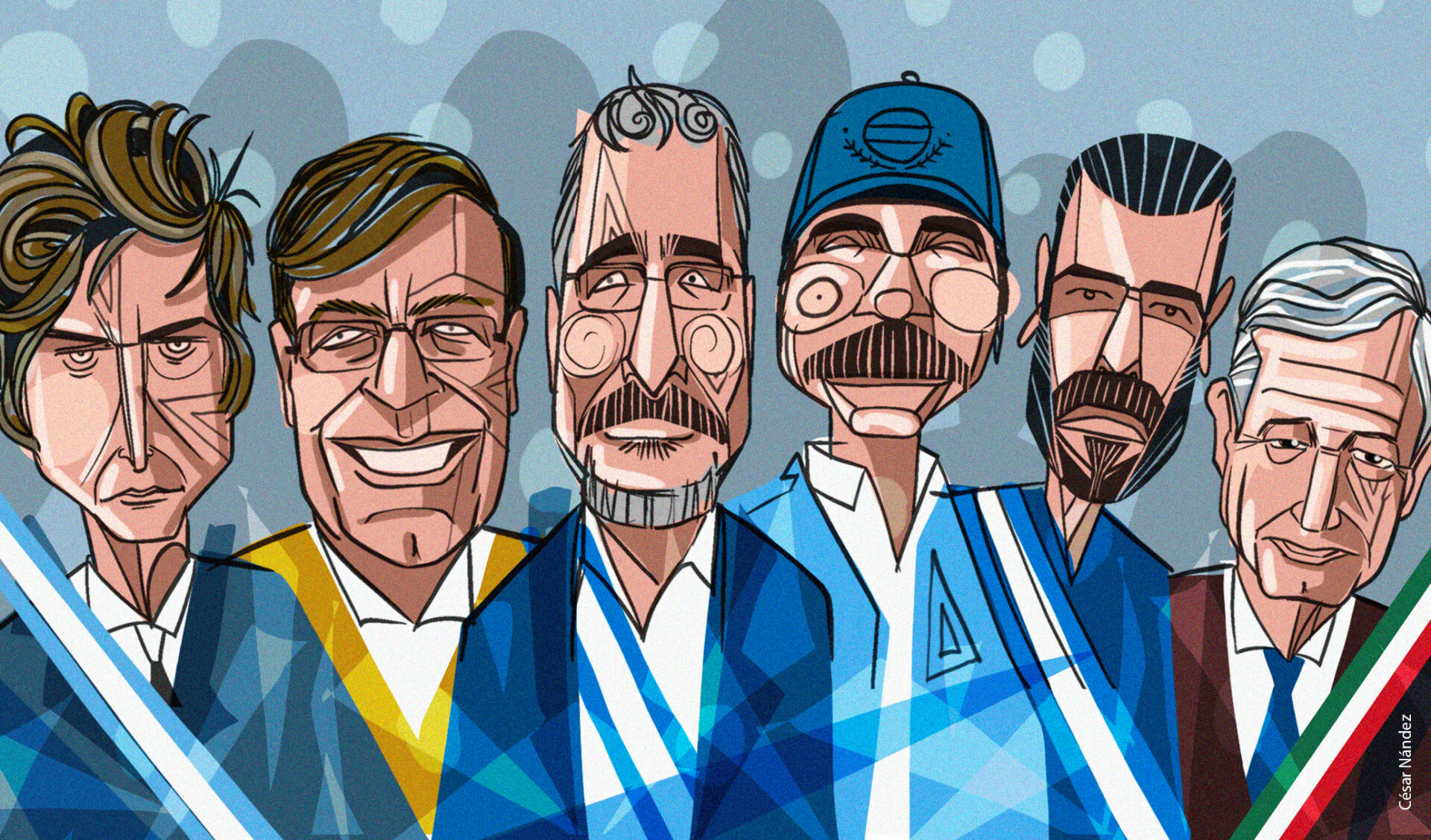Evaluating a year in a region as complex and heterogeneous as Latin America is an exercise that requires a balance between some relevant issues selected and the countries that are the focus of attention. Most of them have a cross-cutting nature, but sometimes the profile is singular. In this task, we have elucidated the situation at the end of the year through a series of names succinctly enunciated, at the risk of leaving others no less important unmentioned. A useful exercise to also foresee the issues and scenarios of 2024.
Nayib Bukele has led El Salvador to the violation of its constitution by running for reelection, one of the historical evils of Latin American politics, following in the footsteps of his neighbor Daniel Ortega three decades ago. Under the cover of an unprecedented propaganda machine, his example crosses borders under the lure of having contributed to control one of the scourges of the region, such as violence in which Colombia, Mexico, and Paraguay are among the five worst classified in the Global Organized Crime Index 2023 that analyzes all countries in the world.
Guatemala‘s economic elites maintain control of the country, supported by a fragile and deinstitutionalized party system, low rates of popular participation, and a highly corrupt political class. The elections held in 2023 gave the victory to Bernardo Arévalo, someone alien to this scenario. However, the most recalcitrant sectors of the judiciary and the Public Prosecutor’s Office are doing everything possible to prevent him from taking office despite the social support he has, including the majority indigenous world in the country, and the international community.
For almost eighty years, the struggle between Peronism and anti-Peronism has defined Argentine politics. However, the arrival of Javier Milei to the presidency has meant a resounding change with unforeseeable consequences. Moreover, it ties in with the current times of singular politicians who lack party machinery, theoretically challenge the status quo, channel social frustration, and show radical positions on identity issues
Claudia Sheinbaum is not the covered candidate of MORENA, the movement of President Andrés Manuel López Obrador. Even if it is only a spurious difference with respect to the classic practices of the PRI, the hegemonic party that ruled Mexico for seven decades now practically disappeared. Her nomination resulted from a process of internal consultation with the militants through surveys prior approval of the leader, who placed in her his expectations of continuity of the 4T, the term given to his visionary project.
Together with Uruguay and Costa Rica, Chile tops the different rankings that measure the performance of democracy in Latin America. However, after four years in the endeavor, it has been unable to move forward with the desired constitutional reform despite the enormous amount of work carried out. This is evidence of the difficulties of establishing minimum consensus in situations of acute ideological and emotional polarization.
The Colombian local elections of 2019 anticipated the turn that brought to the presidency in 2022 for the first time the candidate of the left, who assumed power in a context of enormous expectations. Gustavo Petro‘s bet on total peace propitiated a plural ministerial cabinet that, however, he dismantled after a few months. In October, the municipal elections meant a defeat for the government, reproducing in reverse the events of four years earlier. Medellín, where in 2019 a candidate close to Petro had triumphed, witnessed the return of his antagonist, Federico Gutiérrez, who obtained 73.6% of the vote.
Since the beginning of the century, China has become Latin America’s leading trade partner and investor. Present in practically all countries, only Paraguay recognizes Taiwan, it has a soft power that such an expression is difficult to measure. Chancay, on the Peruvian coast, 60 km from Lima, is the great port project that symbolizes this presence and at the same time represents the opening of the continent to the Pacific Ocean. Brazil will also be a user of the port, shortening the average freight transport time by two weeks.
The Amazon is the epitome of the various arguments linked to the COP28 agenda, at the summit of which Latin American governments were present. The limitation of fossil fuels contrasts with the ambiguous Brazilian position, which proposes joining OPEP as an observer country, or that of the Colombian government, which is recalcitrant in matters related to mining and oil and gas extraction. But Minera Panama has also convulsed the life of a country whose economy is going through a rough patch due to the drought-related decline in the daily number of ships passing through the canal. Since 1997, open-pit copper mining has accounted for 5% of the country’s annual GDP and is now catalyzing a popular ecological conscience mobilized as rarely before.
La Bestia is the summary of the emigration that plagues much of the region, as is the Darien gap. A train reflecting the Mexican railroad system in which its freight cars were loaded with about half a million migrants in its last stage of the long route north. Venezuelans, mainly, but also Haitians and Ecuadorians, as well as from other continents, are crowded together searching for the “American dream”, even generating cooperative tasks through social networks that lessen the role played so far by the smugglers known as coyotes.
The Essequibo is most probably Venezuelan land, but no international tribunal has ruled on the matter. To provoke the unwavering adhesion of the population through a plebiscite that endorses it from an autocratic watchtower and without any procedural guarantees is a vain cry in the void, irresponsible and sinister. It supposes the adherence to a hollow and manipulative nationalism that hides the purpose of distracting attention in order to keep the authoritarian government of Nicolás Maduro in power, even at the cost of threatening a military conflict.












